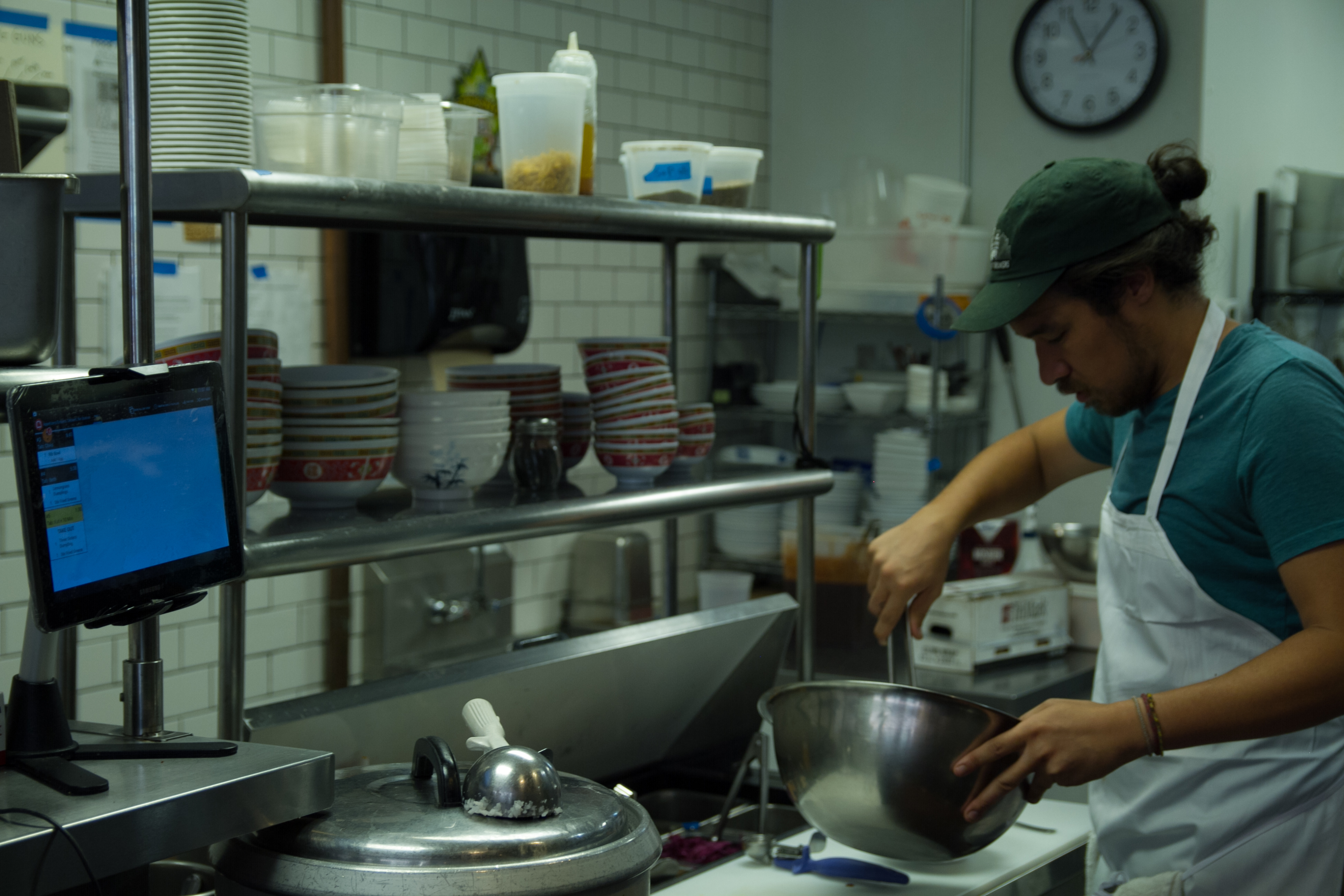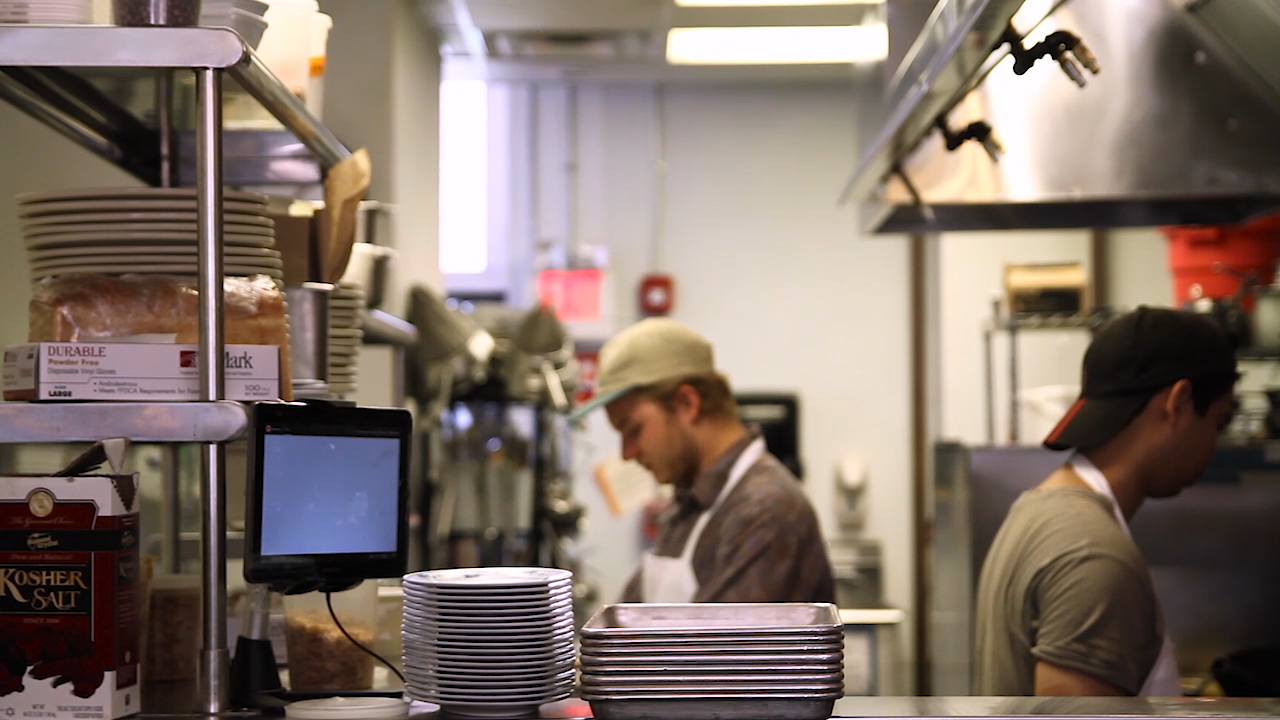
Irene Li Says to Keep Your Staff, Teach Your Staff
Irene Li wants restaurant work to be a viable option for anyone who loves food. Here’s how she’s making it happen in her restaurant.

Dahlia SnaidermanAuthor
Irene Li, owner and operator of Mei Mei Street Kitchen, in Boston, MA, recently spoke at a restaurant industry event. After her talk, she was approached by a middle-aged man who had tears in his eyes. He said to her, “I love food so much, but this industry chewed me up and spat me out.”
It’s a story she’s deeply familiar with, and she’s fired up about it.
Irene Li is committed to making the restaurant industry a viable, long-term option for everyone. “People who love food deserve to be able to actually work in food,” she said. “We should have jobs that are livable, that are not taking advantage of the people who do them.”
When Irene and her siblings started the Mei Mei food truck back in 2012, she was all about the food and creating the perfect menu composed of creative Chinese-American dishes. Now, after expanding to a brick-and-mortar location, launching a cookbook and a line of sauces, and running a shipping container pop-up and a catering division, the food is still front of mind, but the bulk of Irene’s considerable energy goes toward making the jobs at Mei Mei the best they can be.
What do we have to do to make Mei Mei, or any restaurant job, a ‘real job’?

Irene Li
Founder, Mei Mei
“If that means benefits, if that means career advancement, whatever it is, we really want to figure that out. Because that's how the restaurant industry is gonna survive,” said Irene.
In terms of benefits, there are a number of things Mei Mei does for its staff. One of them is providing healthcare coverage. “We cover 50% for any full-time employee who wants to enroll in one of our plans,” said Irene. But, beyond that, she also takes an active approach to making sure her staff get the care they need. “We also make an effort to help our employees shop for primary care physicians and for mental health professionals so that they're not navigating this crazy huge website that’s basically impossible.” They’re even building a directory of medical professionals that are a good fit for Mei Mei staff.
Irene also set up an employee grocery program, where staff have the opportunity to stock their home fridges through the same sustainable food supply channels Mei Mei uses. Irene said she decided to implement the program because despite spending their days elbow-deep in amazing food, restaurant staff are still more likely than the general population to face food insecurity, “which is kind of ironic and disgusting all at the same time,” she added.
But one of the biggest benefits Mei Mei provides is a little less tangible: Constant training in every area of running a restaurant.

Mei Mei offers thorough new-hire training, guided by a document called the “Onboarding Passport,” which makes sure a new hire is trained in everything they need to know, with sign-offs from the trainer for each section. It’s great for accountability, and for constantly improving the initial training process, she said.
Every employee at Mei Mei also gets to learn how to run a small business, because the restaurant is run on open-book management.
All employees learn “how to read a P&L, what’s a good target for sales or cost of goods, and then generally just how the restaurant business is doing,” said Irene. “You get to go to class, and you get paid to sit and learn instead of just [being] paid to wash dishes or burn yourself on the line.”
Then, the business’s financials are shared with every staff member in a monthly meeting, and the team can discuss why a certain metric is up or down, and what each team member can do to make an impact. “I think we have a lot of folks who apply and sort of say, ‘I want to learn about how small business works.’ And before we had open book management, we would kind of say like, cool, that's great, but mostly what you're going to do is wash dishes or cut vegetables, so hopefully you'll absorb something by osmosis. But now we can actually say to them, ‘here are some best practices for business, for accounting, for financial management.’”
This kind of model isn’t common yet, but there are a handful of other restaurant businesses who’ve adopted it. Even so, Mei Mei showing the industry what this type of transparent training can look like.
For a lot of our employees, this is the first time they've received any financial information, much less training, through a restaurant job.

Irene Li
Founder, Mei Mei
And the open-book management training hasn't just helped Mei Mei’s staff with their own career knowledge — it’s another way they show their staff they care about them as people, not just employees. “We even have some staff who are able to apply that in really useful ways to their personal lives, for budgeting or credit cards or managing debt. Helping them wade into that scary area of personal finance has been really rewarding for us as well,” said Irene.
She’s also implemented a peer training program, where every monthly meeting at Mei Mei consists of “10 minutes of announcements, 10 minutes of finance, and then 30 minutes of any kind of training that anyone on the team is really excited about,” she explained.
That means any staff member can bring their specific knowledge to the table and share it with their peers. Recently, a cook led a training on herbs so that if anyone has to jump onto the line at any time, they know how to pick, pack, and use every herb they have in house.
Another employee-led training was about gender-inclusive service. The team learned about how referring to a table as “ladies” or “dudes” can be harmful. “We have had some folks on the team run trainings to just talk about what it feels like to be mis-gendered by a stranger and how that can impact your experience from the get-go in a restaurant,” she said.

Irene says part of what makes employee-run trainings so effective is that firstly, all the training doesn’t fall on her shoulders, and secondly, it shows the staff that management knows they’re bringing something special to the table.

Last month, Mei Mei brought in a committee from the City of Boston that does age and dementia training for small businesses. Irene’s father had Alzheimer’s and some physical impairments, and she remembers how tough it got to go out to restaurants together. By training her staff about this issue, “[we’re] making sure that our version of hospitality extends to all kinds of people,” she said. “And proving to them that we are a safe place for them and making them want to come back.”
“A big part of that is just training the staff and reminding them to have a little bit more patience. You don't have to be a medical professional, you don't have to necessarily have personal experience. Just knowing that I'm going to take a little extra time to make sure this guest has a great experience,” she explained.
All of these trainings are an investment in the Mei Mei team, and the staff appreciate it. This employee investment creates an environment that feels like a place where you can have an actual career.
Staff turnover in the restaurant industry hit 75% in 2019. At Mei Mei, it hovers around 19% (excluding students who tend to work seasonally). On average, the tenure of a Mei Mei staff member is two to three years.
When thinking about why she wants to make restaurant careers viable and enjoyable for everyone who loves food, Irene brought up the psychological theory called Maslow’s Hierarchy of Needs.
Maslow’s Hierarchy of Needs is often depicted as a pyramid. At the bottom of the pyramid is a person’s most basic physiological needs: shelter, water, and food. Above that is safety and security. Continuing upward, there’s belonging and love, then self-esteem, and then, at the very top, is self-actualization. None of the upper tiers can exist without the foundations below them, and this is what Irene wants to change within the restaurant industry.
“[We’re] trying to create a space that just feels safe, where you can be a little bit relaxed, where you can be yourself,” she said. “Do you feel like you're doing what you're supposed to be doing? Do you have a sense of ‘this is where I belong, this is what I excel at. I'm making the most of who I am and what I know?’”
With their basic needs being fulfilled by their employer, in a way that unfortunately isn’t yet the norm, the staff at Mei Mei have a real shot at self-actualization and a long-term career in the restaurant industry.
Related Restaurant Operations Resources
Is this article helpful?
DISCLAIMER: This information is provided for general informational purposes only, and publication does not constitute an endorsement. Toast does not warrant the accuracy or completeness of any information, text, graphics, links, or other items contained within this content. Toast does not guarantee you will achieve any specific results if you follow any advice herein. It may be advisable for you to consult with a professional such as a lawyer, accountant, or business advisor for advice specific to your situation.
Read More
Subscribe to On the Line
Sign up to get industry intel, advice, tools, and honest takes from real people tackling their restaurants’ greatest challenges.

